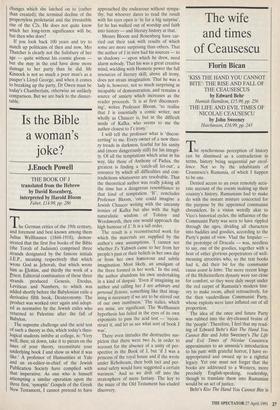Is the Bible a woman's joke?
J.Enoch Powell
THE BOOK OF J translated from the Hebrew by David Rosenberg, The German critics of the 19th century, and foremost and best known among them Julius Wellhausen (1844-1918), demon- strated that the first five books of the Bible (the Torah of Judaism) comprised three strands designated by the famous initials J.E.P., meaning respectively that which wrote God as Jehovah, that which wrote him as Elohim, and thirdly the work of a Priest. Editorial combination of these three strands produced Genesis, Exodus, Leviticus and Numbers, to which was added shortly before the Babylonian exile a derivative fifth book, Deuteronomy. The product was worked over again and adopt- ed as normative by the Jewish exiles who returned to Palestine after the fall of Babylon.
The supreme challenge and the acid test of such a theory as this, which today's theo- logical students imbibe at college, is: 'Very well, then; sit down, take it to pieces on the lines of your theory, reconstitute your underlying book J and show us what it was like.' A professor of Humanities at Yale and an ex-editor-in-chief of the Jewish Publication Society have complied with that imperative. As one who is himself attempting a similar operation upon the three first, 'synoptic' Gospels of the Greek New Testament, I cannot pretend to have approached the endeavour without sympa- thy; but whoever dares to read the result with his eyes open is 'in for a big surprise', for he has walked out of worship and faith into history — and literary history at that.
Messrs Bloom and Rosenberg have car- ried out their task with results of which some are more surprising than others. That the author of J in turn had his sources — to us shadowy — upon which he drew, need alarm nobody. That his was a great creative mind, wielding with Homeric power the full resources of literary skill, above all irony, does not strain imagination. That he was a lady is, however, not so much surprising as incapable of demonstration, and remains a source of anxiety which increases as the reader proceeds. 'It is at first disconcert- ing', writes Professor Bloom, 'to realise that J is essentially a comic writer, not wholly as Chaucer is, but in the difficult mode of Kafka, who seems to me the author closest to J's irony.'
I will tell the professor what is 'discon- certing' to me. Every owner of a new theo- ry treads in darkness, fearful for his sanity and (more dangerously still) for his integri- ty. Of all the temptations which arise in his way, like those of Anthony of Padua, the greatest is finding a 'catch-all let-out', a resource by which all difficulties and con- tradictions whatsoever are resolvable. That the theoretical author was really joking all the time has a dangerous resemblance to that kind of temptation. 'If ', concludes Professor Bloom, 'one could imagine a Jewish Chaucer writing with the uncanny ironies of Kafka but also with the high naturalistic wisdom of Tolstoy and Wordsworth, then one would approach the high humour of J.' It is a tall order. The result is a reconstructed work for which the materials are supplied by the author's own assumptions. 'I cannot see whether J's Yahweh came to her from her people's past or their beliefs in her own day or from her own humorous and subtle imagination. Most likely, an amalgam of the three formed in her work.' In the end, the author abandons his own undertaking in a kind of despair. 'Even if imagining an author and calling her J are arbitrary and personal fictions, something like that imag- ining is necessary if we are to be stirred out of our own numbness.' The italics, which are mine, are significant. The Wellhausen hypothesis has failed in the eyes of its own exponents to pass the acid test — 'recon- struct it, and let us see what sort of book J was'.
There even intrudes the destructive sus- picion that there were two Js, in order to account for the absence of a unity of per- spective in the Book of J, but 'if J was a princess of the royal house and if she wrote under Rehoboam, then both tact and per- sonal safety would have suggested a certain wariness.' And so we drift off into the stratosphere of mere fantasy. The key to the maze of the Old Testament has eluded discovery.


















































 Previous page
Previous page